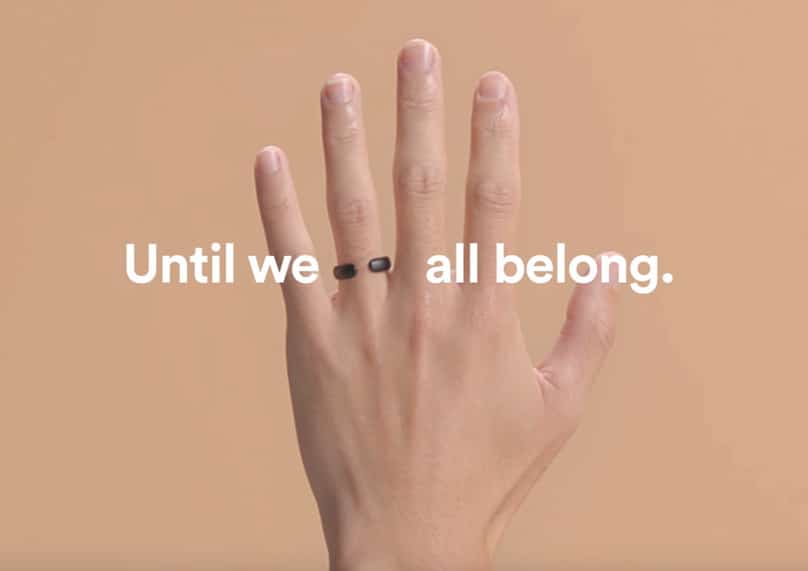
Last week, it was announced that Until We All Belong would be launched. The campaign sees AirBNB team up with other players like Qantas, Foxtel, ANZ, Google and eBay to bring you the ‘acceptance ring;’ a black ring which does not close up. The gap is meant to symbolise the ‘gap’ in marriage legislation which does not allow same-sex couples to be married.
Simultaneously, a series of videos was released, with various people saying that they would wear the ring until their sister, brother, aunt, uncle, best friend etc. can ‘belong.’
Many of them spoke about the need to ‘close the gap.’
I have to admit to being amused that this was labelled as “the most public corporate declaration for marriage equality in Australia to date,” because it seems that all we have at the moment are corporate declarations about marriage, including the recent letter from more than 20 corporate CEOs to the Prime Minister attempting to change his mind on a people’s vote; scores of corporate floats in the Mardi Gras Parade; Qantas swapping the red and white on its planes for the rainbow flag; full page advertisements taken out in national newspapers and more.
There is nothing grassroots about the campaign to redefine marriage; everything about it is a “public corporate declaration.” But yes, the ‘acceptance rings’ are another one.
I was also surprised that the campaign would co-opt the language of ‘closing the gap.’ The Close the Gap campaign is a serious one which seeks to address the profound difference in life expectancy between Indigenous and non-Indigenous Australians.
This “gap” is a real issue of human rights and real issue of equality, and so I seriously question the social awareness of someone who thinks using the same language in a push to redefine marriage is wise or just.
But back to the rings. 250,000 ‘acceptance rings’ have been produced, at a total cost of cash and in-kind support of $5 million. They will be free of charge, with only postage costs charged to someone ordering them online.
The rings were also offered free to media outlets, and it was confirmed that Qantas staff and cabin crew would wear them, and Google Australia would give a ring to each of its 1300 staff. It is not clear whether employees at the 16 other sponsoring companies will be given rings to wear, but I imagine it’s likely. And therein lies the problem.
If these rings are being handed out to employees at a company which has signed up to Australian Marriage Equality and whose CEO has personally written to the Prime Minister lobbying for a change in the marriage law, what happens to an employee who believes marriage is between a man and a woman? The companies have said that no one will be forced to wear the ring – that is, it won’t be part of a dress code or uniform policy – but surely the giving of the ring contains an element of coercion.
For example, it is well known that Qantas CEO Alan Joyce is gay, he is a vocal advocate for marriage redefinition and Qantas is a corporate sponsor of the Until We All Belong campaign. Indeed, the person who designed the rings is the same person who designed the Qantas business class seats and lounges. Do you think any employee who attends a meeting with Mr Joyce would be game to not be wearing a ring when they see him? Will employees be asked to explain why they do not want to wear the ring? Will they be targeted for doing so?
I’m not being an alarmist. In recent weeks, we have seen individual employees targeted simply on the suspicion that they might believe marriage is between a man and a woman. IBM’s Sydney managing director Mark Allaby was forced to step down from his board position at the Lachlan Macquarie Institute – an internship programme to develop leadership potential in young Christians – after same-sex marriage activists claimed such a role, even though undertaken outside working hours, was incompatible with IBM’s “diversity” policies. After claiming Allaby’s scalp, activists targeted Steve Chavura, an academic at Macquarie University, for the same reason.
In neither of these cases did the employer defend the right of their employee to be connected with a faith-based organisation. Indeed, The Australian article reporting on the Allaby incident contained the ominous words: “IBM did not respond to questions about whether staff were free to engage with external organisations, including religious groups, outside of their employment with the company.”
“We will not be responding on this,” an IBM spokeswoman said.
We have seen that activists have no problem in punishing people who believe in marriage by suggesting to their employers that religious belief is incompatible with diversity (all the while ignoring the irony of such a claim.) These ‘acceptance rings,’ then, pose a risk to employees who hold to the timeless definition of marriage because it allows them to be easily identified by those who would seek to target them for demise.
